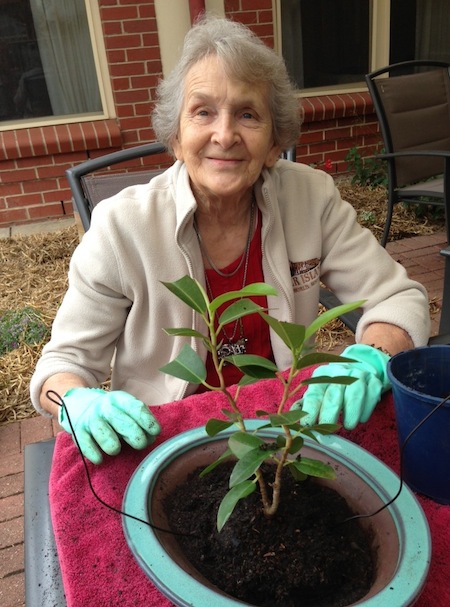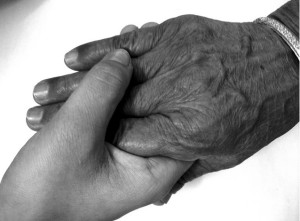It is well known that Tasmania’s population is ageing and as more people retain their natural teeth into their moonlight years, the demand for oral health services in aged care facilities is also on the increase. For many people with complicated medical histories, polypharmacy (multiple medications), and conditions like Alzheimer’s and Dementia the need to be able to maintain good oral hygiene and a disease-free mouth becomes so much more important.
Elderly people are unfortunately much more susceptible to oral diseases, which can significantly contribute to further medical complications and complaints. Conditions such as chronic decay, infections, gum problems, periodontal infections, oral fungal infections, poor oral hygiene, and broken down teeth and ill fitting dentures can all impact on a persons overall health and immune system, particularly the elderly.
As we age, these factors can present very important causative complications to an elderly person’s existing medical conditions in cases such as Diabetes.
The reality is however, that treating aged care residents is often a challenging and sometimes very difficult task, for reasons such as lack of proper equipment, time constraints and an overall struggle in behavioural and physical management of these patients. This is particularly the case for nursing home residents who are unfortunately suffering from Dementia and Alzheimer’s which can prevent them from being able to remain seated or to have any or a limited congnitive awareness of any necessary procedures that needs to be completed.
A recent nationwide study of nursing home residents found the following:
- the great majority of residents (80%) had dementia
- the residents with dementia, especially those with more severe dementia, presented very complex behavioural challenges to both carers and dental professionals. The most common difficulties were:
- 29% of residents refused oral hygiene care
- 25% of residents not opening their mouth
- 24% of residents not understanding directions from carers, and
- 19% of residents kicking or hitting out at carers
- large accumulations of plaque, calculus (tartar) and food debris were present on many residents’ natural teeth and dentures
- the prevalence of having no natural teeth remaining had greatly decreased from studies conducted in the 1970s and the 1980s
- a high level of untreated decay on teeth and roots was present amongst those with natural teeth
- many residents had broken tooth roots but fewer than 10% of residents had any of the broken roots extracted during the study period of one year
- 64% of residents developed new decay on their teeth and 49% developed decay on the roots of their teeth during the study period of one year
- new residents to the nursing homes were developing further oral problems within several months of their admittance
 For many elderly people and those in nursing homes or aged care facilities, their oral hygiene is often poor when they lose their ability to maintain adequate oral hygiene. This arises from an inability to simply brush their teeth due to arthritis or cognitive function. Therefore decay rates, dental infections, broken down teeth, and pain from a neglected dentition is high. These conditions impact on the person’s ability to eat, and their overall health and well being.
For many elderly people and those in nursing homes or aged care facilities, their oral hygiene is often poor when they lose their ability to maintain adequate oral hygiene. This arises from an inability to simply brush their teeth due to arthritis or cognitive function. Therefore decay rates, dental infections, broken down teeth, and pain from a neglected dentition is high. These conditions impact on the person’s ability to eat, and their overall health and well being.
Typically, due to behavioural issues, limited access to regular dental care outside of a hospital, a complicated medical history, or the general frailty of the person, the tendency is often to leave the dentition in its current state. Rather than intervening and removing or repairing teeth that are the source of very high levels of circulating bacteria and considerable pain, the patients dentition continues to deteriorate at a rapid rate. The poor oral health then contributes significantly to other medical conditions and well being,
The Hobart Orofacial Pain and Special Needs Clinic is the only practice of its type in Tasmania that specifically caters to providing treatment to those persons unable to access oral care in a general dental setting.
Persons with Alzheimer’s, Dementia, Parkinson’s, intellectual disability, head injury, and complicated medical histories that may typically require dental treatment under a general anaesthetic in hospital, are treated routinely at the Special Needs clinic using combinations of oral, inhalational, and intravenous sedation in a fully endorsed environment as per the standards set by the Australian and New Zealand College of Anaesthetists for conscious sedation. All persons are treated at concessional Department of Veteran Affairs’ rates for dental care providing significant cost savings to “Bridge the Gap between Affordability and Accessibility” for all residents in Aged Care Facilities.
This treatment will prevent an increase in medical problems and improve the standard of living for the elderly through better oral heath, based on prevention and maintenance.



